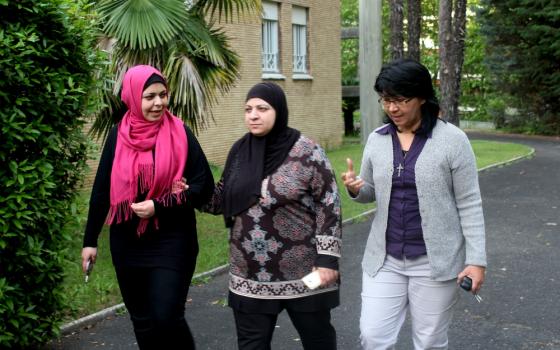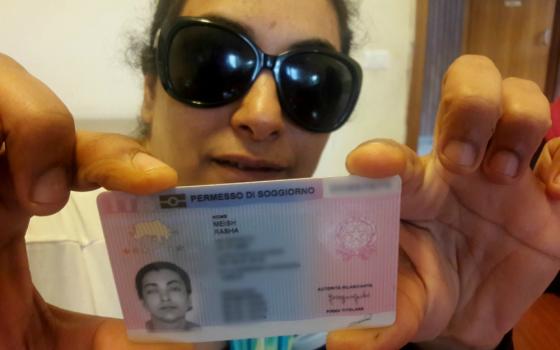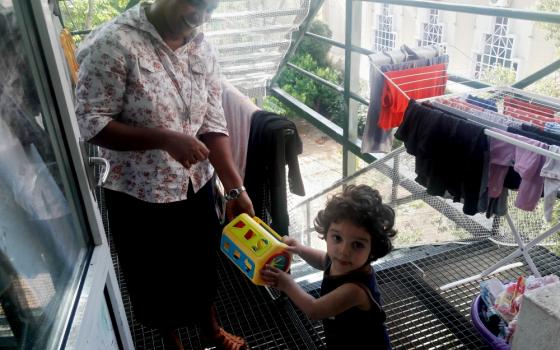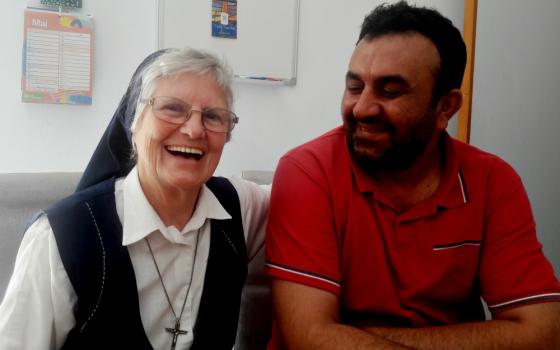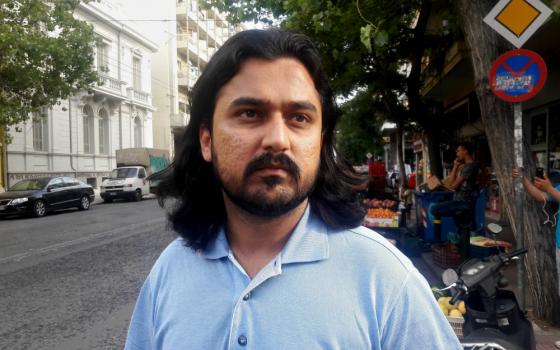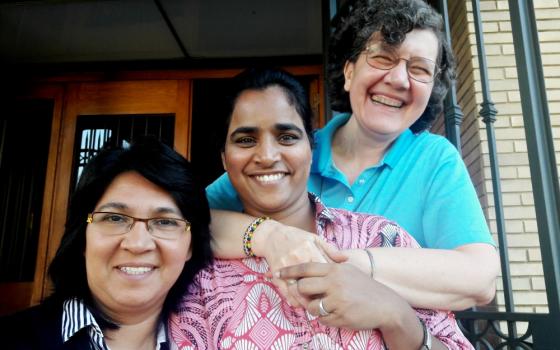Editor's note: Global Sisters Report is bringing a sharper focus to the plight of refugees through this special series, Seeking Refuge, which will follow the journeys refugees make. For more GSR coverage on migration around the world, click here.
______
A cool late afternoon breeze in the garden on the outskirts of Rome is always welcome for Rasha Meish and Maisa Al Said. It is a gentle reminder that the civil war in Syria is far away.
That war drove the two women's families from their homes. Happily, the day-to-day strains of life in a war zone are now over. But the families, related by marriage — Al Said's brother is married to Meish's sister — must contend with painful memories and a cruel hardship: Meish was blinded from a bomb explosion near her home in Damascus.
Ahead is the next challenging step in resettlement: finding permanent housing and work.
In one regard, the families are fortunate: their temporary residence is a resettlement house — Casa della Speranza, or "House of Hope" — on quiet, shaded grounds owned by the Missionary Sisters Servants of the Holy Spirit, an international congregation founded in 1889 in the Netherlands. The grounds house the sisters' general curia, or administrative offices, with 28 sisters from 10 countries living there.
Now in their second year at the house, the families are easing their way into life in Italy. Their time with the sisters, Al Said said, has "been beautiful — like one family."
But a major change awaits them: As agreed to with the sisters, the Syrians are preparing to leave the home later this year, though the deadline has some flexibility. "They will continue living here with us until they find another house where they can live," said Sr. Francisca Florentin Garcete, a Missionary Sisters Servants from Paraguay.
Resettlement is rarely easy. After the initial trauma of being forced to flee, followed by a period of limbo — in the case of the two Syrian families, a shared experience in refugee camps in southern Lebanon — comes the process of seeking asylum, then creating new lives in a place with a strange language, strange ways and an uncertain future.
It is a story being repeated throughout Europe. While the numbers of those arriving in Europe has slowed in comparison to the masses of people landing in 2015 and 2016, "they have by no means stopped," said Joshua Kyller, Catholic Relief Services' country manager in Greece.
By nearly all accounts, the welcome provided by Greece and Italy is now becoming frayed. Much "of the political capital that kept doors open [in countries like Greece and Italy] has been spent and much of the goodwill from volunteers and local communities has been overtaxed," Kyller said. The focus now is ensuring "durable solutions" so that those who have arrived can "integrate into society and start their new lives," Kyller said.
For arrivals trying to settle in a new country, the weight of memory intrudes: missing relatives; nostalgia for a former life; adjustment to different types of religious services (the two Syrian families think the mosques in Rome are too noisy); and, of course, the cuisine.
Meish's and Al Said's families still don't like pasta that much. "The food, the food — falafel, kebab, kibby," Meish said, reciting her list of Syrian delights she misses.
'There aren't any other options'
In some ways, Lebanon was not bad, even in a Syrian refugee camp, said Yara, Al Said's 23-year-old daughter.
"The social life was good," she said, and the Arabic-language schools were decent. "Life was beautiful. We could speak the same language."
Yet as much as the families yearn to return to Syria, with an unsettled war and continued uncertainty about their country's fate, they believe their futures, at least for now, hinge on staying in Italy, where they have been formally granted asylum.
"Our house [in Syria] is destroyed," Yara said. "If we go back there, what will we do there? Everything is finished."
"There aren't any other options," Al Said, a seamstress, said, shrugging. "Where can we go now?"
Settling in a new country doesn't mean that thoughts of going elsewhere stop. The allure of Northern Europe with its more robust economies remains attractive for many of those who find themselves in first-arrival countries, said Sacred Heart Sr. Florence de la Villeon, who heads the refugee ministry of the Rome-based International Union of Superiors General.
Greece has the highest current unemployment rate among EU countries, at 20.1 percent, while Italy's jobless rate is the third highest, at 10.7 percent. By contrast, Germany's unemployment rate is the second lowest, at 3.4 percent.
The experience of Meish's family is emblematic of the changes underway among refugees settling in Europe: Meish has brothers in Germany, France and Sweden, and other family members remain in Syria. Meanwhile, Al Said's husband is in Brazil, and it is not clear if or when he will be reunited with his family.
Amid the struggles of resettlement, these two families and other refugees have support from a broad Italian church alliance to help ease their way.
The ecumenical organization Sant'Egidio, working with Italian Protestant churches and the Italian government, created a program of "humanitarian corridors" in late 2015 to assist those who are particularly vulnerable. Volunteers working in refugee camps interview and select families who are eventually allowed to enter Italy legally. More than 2,500 persons have entered Italy under the program, according to Sant'Egidio.
"The selection of the families is done according to the needs," said Argentine Sr. Carmen Elisa Bandeo, one of several Missionary Sisters Servants of the Holy Spirit, also known as Holy Spirit Sisters, working with the Syrian families. She noted that Meish's family was among the first groups to arrive in Rome, in 2016. The two families fled Syria in 2014; Meish’s family arrived from the Lebanese refugee camp in February 2016 and Al Said’s family in October of that year.
In addition to Meish's eye condition, one of Meish's children, 11-year-old Omar, is a special-needs child. (Meish has three children; Al Said has two children with her in Rome. She has another son who is with his father in Brazil.)
"It was a big joy for us when he entered school," said Florentin.
In Rome, other refugee families are living in temporary residences with other congregations like those provided by the Missionary Sisters Servants. (In addition to the families from Syria, the Missionary Sisters Servants are hosting a family from Cameroon.) Refugees being resettled in Italy are also living in shelters operated by Centro Astalli, which is the Italian name for Jesuit Refugee Service, as well as by organizations like Caritas, de la Villeon said.
Refugees normally live in these quarters up to a year, though sometimes the length of stay is extended to two years.
At a shelter in Athens
In Athens, Greece, Jesuit Refugee Service, with assistance from the Missionary Sisters Servants, runs a shelter that houses 50 refugees from, among other countries, Syria, Iraq, Afghanistan, Pakistan, the Democratic Republic of Congo and Cameroon. It also operates an education center for 175 children, both recent arrivals and those from immigrant families who have settled in Athens, and an integration program for new arrivals that provides legal, social and medical support.
The atmosphere among the refugees at the Athens shelter is noisy, lively and spirited.
"They share a lot," said Indian Sr. Preethi Silva, who helps administer the shelter, working with Sr. Ada Lick from Austria. "When the Syrians celebrate a birthday, the Afghans will bake a cake."
But the atmosphere is also tempered by the troubles the refugees face.
The family of Abdul Maroof Haidari, a government administrator, fled Afghanistan two years ago because of threats from the Taliban. He and his three children, ages 6 to 14, recently left Athens to rejoin his wife and their mother, Mahboba, who is living now in the Netherlands.
For Haidari, Athens evokes painful memories. A tortuous journey took his family from Afghanistan to Iran, Turkey, then Greece — partly over land, partly by boat. His wife gave birth to a son who had severe physical and medical problems. He died a year later.
Haidari blames the journey for his son's death, and the experience drove his wife to seek refuge in Belgium, where her brother lives. She made it as far as the Netherlands, where the family hopes to settle permanently.
"I'm happy that we'll be together," said Haidari, a volunteer at a kitchen Jesuit Refugee Service runs in Athens. He appreciates the support he and his family have received from Jesuit Refugee Service and the Holy Spirit Sisters but, in an interview in May, he said he was eager to rejoin his wife.
"We've had a difficult time here, so hard," he said, before leaving for the Netherlands in late June. "I'll be happy to go to Holland."
By contrast, Syed Abuturab Naqui hopes he and family can stay in Athens because of his claims of religious persecution in their native Pakistan. The family are Shiite, a minority in predominantly Sunni Pakistan. Naqui and his family have been in Greece two years and want to stay because of what Naqui calls the wider sense of freedom, particularly religious freedom, that the family finds there.
Naqui is the son of a religious scholar who he says was killed by Pakistani authorities for his criticism of religious persecution of the Shiite minority. Naqui's journey in 2016 with family across land and sea included stops in Iran and Turkey and a year on the island of Lesbos.
Naqui's wife and the couple's three sons accompanied him; after arriving in Athens, the couple had a fourth son. In all, he and the family have spent two years in Greece, including a year at the Jesuit Refugee Service shelter.
It is not easy proving a case of religious persecution, Naqui acknowledges, and his focus now is entirely on having his asylum claim heard for the fourth time. It has been rejected three times already because, he said, it is hard to make a claim of persecution based on his father's experience.
"I am here to save my life and my family's," he said, saying that the Pakistani government could eventually target his sons also. "I could sacrifice if it was just me, but they are tracking my family, too."
Athens' noisy city streets are far away from the quiet hills surrounding Rome's outskirts. But Naqui finds solace, peace and hope there.
The hope of permanent resettlement is real — his oldest son is learning Greek and he is studying it, too, though "I'm not learning it well."
Still, "I've been here two years," he said and "no one is asking us about religion."
For the Syrian families in Rome, being allowed to stay means focusing on next steps. One is Meish's medical condition; seeing a doctor can take months, and she is still trying to find an eye specialist to perform surgery that could help her regain some sight. Though basic medical care in Italy is free or provided at low cost, specialized operations can be costly and the family right now cannot pay for such an operation.
Then there is the issue of employment. Meish worked as a hairdresser in Damascus, but she is not working now due to her disability. Yara is volunteering at a residence for the blind and hopes to return to graphic design, her focus of study when she lived in Syria.
"It's difficult," she said of trying to get a design job in Rome. "There are a lot of [Italian] artists here, and they're looking for work."
"It's not easy," said Florentin, the Paraguayan sister. "People will always prefer an Italian for the job."
Even so, now that the children are settling in and learning Italian, staying in Italy makes the most sense, the families say.
Integration, say the sisters, often hinges on generational differences in learning a new language. "Integration is possible, but it will be much easier for the children than for the parents," Bandeo said.
Despite such challenges for adults, Bandeo said women facing resettlement may have certain advantages over men.
"The [refugee] women here in Italy are full of determination, and one reason they tend to do better initially than the men is that they are forced to enter the reality of work sooner," she said, based on what she has seen with refugee women from different countries.
"For example, women find cleaning jobs more easily than men, and that puts them in contact with the everyday work world more quickly. Men take longer."
At the residence provided by the sisters, the families cook together and celebrate holidays and festivals with the sisters. "We pray to the same God," Yara said.
They say they are afraid at times about the future, about the uncertainty — where they will find a home, for example.
Yara, who appears confident in Italian and says she likes learning the language, said that life in Rome has both advantages but at least one serious drawback — missing relatives left behind in Syria and scattered elsewhere in Europe.
"We have peace," she said, "but we don't have family."
[Chris Herlinger is GSR international correspondent. His email address is cherlinger@ncronline.org.]
Next in this series: How do refugees integrate into their new surroundings without losing their cultural, ethnic and religious identity?

